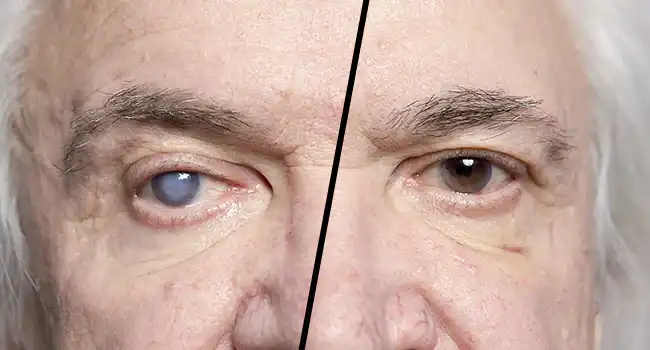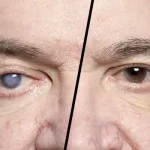Welcome to our blog on everything one must know about cataract surgery, where we’ll break down the process into multiple sections to help you understand what cataract surgery procedure is, what happens during the procedure, and how it can positively impact your life. Before you go in for surgery, we’ll walk you through easy-to-follow preparations to ensure you’re ready. Wondering about recovery time? We’ve got you covered. We’ll also discuss the possible risks and side effects, providing straightforward information. And for those curious about the cost, we’ll explore that too. Join us as we take a clear and simple journey through the ins and outs of cataract surgery, empowering you with the knowledge to make confident decisions about your eye health.
What Is Cataract Surgery ?
Cataract surgery is a procedure that involves removing the cloudy lens of the eye, known as the cataract, and replacing it with an artificial lens called an intraocular lens (IOL). The surgery aims to improve vision and restore clarity to the affected eye.
During the procedure, the surgeon makes a small incision in the eye and uses advanced techniques, such as phacoemulsification, to break up and remove the cataract. The IOL is then inserted into the eye to replace the natural lens. Cataract eye surgery is typically performed on an outpatient basis and is considered to be a safe and effective treatment option for individuals with cataracts.
When To Go For Cataract Surgery?
Determining the right time to undergo cataract surgery is a crucial aspect. The decision is often based on the impact cataracts have on your daily life and vision. If you find yourself experiencing difficulties like blurry vision, increased sensitivity to light, or trouble with night vision, it might be an indication that cataract surgery could significantly improve your quality of life. Additionally, if cataracts start interfering with your ability to perform routine activities such as reading, driving, or recognizing faces, it may be time to consider surgery.
However, the decision isn’t solely based on the severity of symptoms of cataract. Your eye doctor will assess the overall health of your eyes, examine factors like the progression of cataracts, the impact on your daily activities, and your personal preferences. It’s essential to have open and honest discussions with your eye care professional to determine the optimal timing for cataract surgery that aligns with your individual needs and lifestyle. Regular eye examinations will play a crucial role in monitoring the progression of cataracts and guiding you towards the right time to undergo this safe and effective surgical intervention.
Also read about what are the different types of cataract lenses.
Cataract Surgery Procedure: What Happens During Cataract Surgery?
Here’s a step-by-step breakdown of what typically happens before and after cataract surgery as well as during the procedure:
- Preparation: Before the surgery begins, your eye will be numbed with local anesthesia to ensure you’re comfortable throughout the procedure. You may also receive a sedative to help you relax.
- Incision: To access the cataract, the surgeon makes a small incision in the cornea. This incision may be so tiny that stitches are often unnecessary.
- Capsulotomy: Once the incision is made, a circular opening is created in the front part of the thin membrane surrounding the natural lens, called the lens capsule. This step provides access to the cataract.
- Breaking Up the Cloudy Lens: The cloudy lens (cataract) is then broken into smaller fragments using a specialized ultrasound device called a phacoemulsifier or femtolaser. The tiny pieces are suctioned out of the eye.
- Intraocular Lens (IOL) Placement: With the cataract removed, an artificial intraocular lens (IOL) is inserted through the same incision. The IOL serves as a replacement for the natural lens, restoring clear vision.
- Closure: In many cases, the incision is self-sealing and doesn’t require stitches. The natural healing process helps close the incision.
- Recovery: After the procedure, you’ll spend a short time in a recovery area, allowing the medical team to monitor your immediate post-operative response.
What Are the Advantages of Cataract Surgery?
Cataract surgery offers several advantages for individuals with cataracts. These include:
- Improved Vision: Cataract surgery can restore clear vision, allowing you to see objects more sharply and vividly.
- Enhanced Quality of Life: By removing the clouded lens, cataract eye surgery can improve your ability to perform daily activities, such as reading, driving, and enjoying hobbies.
- Reduced Dependence on Glasses: In many cases, cataract surgery can reduce or eliminate the need for glasses or contact lenses, particularly for distance vision.
- Long-Term Results: Once a cataract is removed, it does not grow back, meaning the results of cataract surgery are typically permanent.
It is important to discuss the potential benefits and risks of cataract surgery procedure with your eye care professional to determine if it is the right option for you.
How to Prepare for Cataract Surgery?
Preparing for cataract surgery involves a few important steps to ensure a successful procedure and recovery.
- Consultation with an Eye Care Professional: Schedule an appointment with an eye doctor or ophthalmologist to evaluate your eye health and discuss the surgery.
- Medical Evaluation: Your eye care professional may request a medical evaluation to assess your overall health and identify any potential risks or complications.
- Medication Review: Inform your doctor about any medications or supplements you are taking, as some may need to be temporarily discontinued before the surgery.
- Preoperative Instructions: Follow any preoperative instructions provided by your surgeon, such as fasting before the surgery or avoiding certain medications.
- Arrangements for Transportation: Since you may not be able to drive immediately after the surgery, arrange for someone to accompany you and drive you home.
Cataract Surgery: Time Taken To Recover
The recovery time after cataract eye surgery varies from person to person, but most individuals experience a relatively quick and smooth post cataract recovery .Immediately after the surgery, you may be required to wear an eye patch or protective shield to protect the eye and promote healing. You may also be prescribed eye drops to prevent infection and reduce inflammation.
It is common to experience some mild discomfort, itching, or blurred vision in the days following the surgery. However, these symptoms typically subside within a few days. Full recovery, including improved vision, can take several weeks. During this time, it is important to follow your surgeon’s post-operative instructions, including avoiding strenuous activities and protecting your eyes from bright sunlight. Also read about detailed precautions after cataract operation.
What Are the Risks and Side Effects of Cataract Surgery?
Like any surgical procedure, cataract surgery carries some potential side effects and risks too. However, the majority of individuals experience successful outcomes with minimal complications.
Some common side effects after cataract eye surgery include temporary blurry or distorted vision, sensitivity to light, mild discomfort or itching, and the need for a new glasses prescription. Serious complications, such as infection or bleeding, are rare but can occur. It is important to promptly report any severe pain, sudden vision changes, or increased redness or swelling to your surgeon.
Overall, cataract eye surgery is a safe and well-tolerated procedure that can significantly improve your vision and quality of life.
What Is the Cost of Cataract Surgery?
The cost of cataract surgery can vary depending on several factors, including the type of procedure, the region where it is performed, surgeon’s experience, and the specific requirements of each individual case.
The cost may include the surgeon’s fees, facility fees, anesthesia fees, and the cost of the intraocular lens (IOL). Additional tests or consultations may also be required, which can add to the overall cost.
To get an accurate estimate of the cost, it is recommended to consult with your surgeon or healthcare provider who can provide a breakdown of the expenses based on your specific situation. At Centre For Sight, it starts from an affordable cost of 20,000 only.
Why Centre For Sight?
- Pioneers of modern bladeless robotic cataract surgery.
- Pioneers of advanced laser systems called Femto cataract surgery in India.
- Presence of over 75 Centres across 30 Cities from 15 States of India.
- All centers equipped with latest state of the art machines and equipment
- Highly experienced surgeons hand picked from India’s reputed medical institutions.
FAQs
Will I still need glasses after cataract surgery?
It depends. Many people experience improved vision without glasses after cataract surgery, especially with the use of advanced intraocular lenses (IOLs). However, you might still need glasses for certain activities, like reading.
Is cataract surgery painful?
Cataract surgery is not painful as it is performed under local anesthesia and postoperative care includes prescribed medications to manage any mild discomfort to ensure painless recovery too.
Can my diet influence the recovery process after cataract surgery?
Yes, eating a healthy, balanced diet rich in vitamins and nutrients can support overall eye health. Foods high in antioxidants, like fruits and vegetables, may aid in the healing process.
Can a cataract come back after Cataract surgery?
No, once a cataract is removed, it doesn’t come back. However, in some cases, a cloudy membrane (posterior capsule) behind the artificial lens may become cloudy over time. This can be easily treated with a simple laser procedure called YAG laser capsulotomy.
Can cataract surgery be done on both eyes at one time?
Yes, cataract surgery can be performed on both eyes simultaneously, but it is suggested to get it done on different days to minimize the risk of complications and ensure a smoother recovery for each eye.
What if my cataract surgery doesn’t work?
While rare, if you’re not satisfied with the results, it’s crucial to communicate openly with your eye surgeon.
What if my vision gets cloudy after surgery?
If your vision becomes cloudy again, it might be due to the posterior capsule becoming cloudy. This is a common occurrence and can be easily treated with a quick and painless laser procedure called YAG laser capsulotomy.





